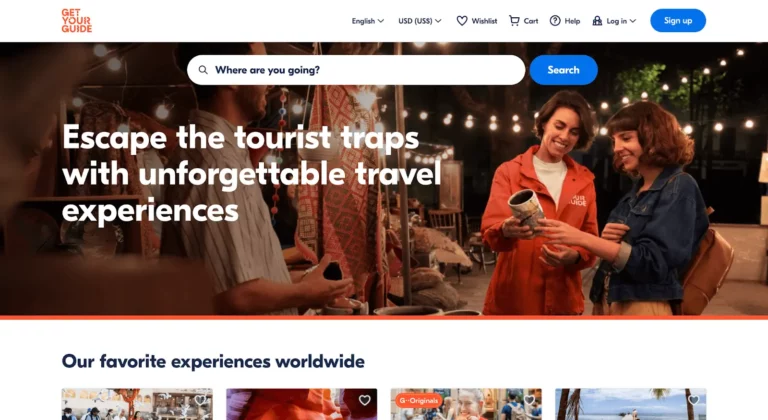
Is your attraction collecting reviews in the right places?
A single review can convince a potential customer to book an experience with your company — that is if they’re finding your reviews. With so many review platforms to choose from, it would be helpful to know which ones your customers are checking the most.
In this post, you’ll learn about the top eight travel review websites that every larger tour or attraction should know about, as well as how to leverage these reviews to get more bookings.
- 1. Google Things To Do
- 2. Facebook
- 3. Tripadvisor
- 4. Expedia
- 5. Foursquare
- 6. Airbnb Experiences
- 7. Yelp
- 8. GetYourGuide
- Best practices for collecting more user reviews on travel websites
- Best practices for using travel review sites to drive more bookings
- Turning travel reviews into more bookings
1. Google Things To Do
Google is the number one website for online reviews, playing a key role in driving bookings for tours and attractions, including the largest travel brands. About 64% of consumers say they are likely to check reviews on Google before visiting a business, which is more than any other review site. Google hosts 73% of all online reviews for businesses, according to an analysis by ReviewTrackers.
You can find your business on Google by typing the name into the search bar on this page or via Google Maps. You can find your business on Google by typing the name into the search bar. If the business doesn’t exist on Google yet, you’ll be prompted to start building a business profile. Claiming your business profile ensures that your social proof, including customer reviews, is easily accessible to potential guests and travelers.
Make sure to claim your business profile so that you can control how your business appears in Google searches as well as manage customer reviews. Now, when guests leave you a Google review, you’ll be able to publicly reply as your business. Businesses that respond to Google reviews are seen as 1.7X more trustworthy than businesses that don’t.
2. Facebook
Facebook is the biggest social media site in the world and the second-biggest review site after Google.
The first step is to create a Facebook page for your business. Then, your customers will be able to “Like” your business, leave you a review, and “recommend” your business to others. When customers go to review your business, Facebook will ask them if they “recommend” it to others, as the example shows above.
Reach out to satisfied customers via email, phone, or in person and ask them to leave a review on your Facebook page. Make it easy for your customers to find your Facebook page by making it the same name as your company, as well as linking to it from your website and emails.
3. Tripadvisor
Tripadvisor is the leading review platform for the tourism industry specifically, boasting 1 billion reviews and opinions from travelers around the world. Travelers tend to leave long-form, in-depth reviews on the platform — 3x longer than other leading online travel agent websites and search engines.
A recent Tripadvisor study found that 68% of people are more likely to book after reading a long review. Meanwhile, three out of four respondents said online reviews were “extremely or very important” when making travel decisions, including for accommodations (82%), attractions (77%), and restaurants (70%).
Even if you’ve never created a Tripadvisor page for your business, there’s a good chance your company already has one. If a customer previously reviewed your business on Tripadvisor, the platform would have automatically created a listing for your business.
To check if you already have a listing, you can search for your company name through this link: https://www.tripadvisor.com/Owners. If your business name shows up, click on it, and start the process of claiming your free listing.
The fastest and simplest way to increase your reviews on TripAdvisor is to remind your guests that your company is open for feedback. Politely ask your guests to review their experience they’re leaving, and follow up with an email linking to your Tripadvisor page.
4. Expedia
Expedia is mostly known as a booking engine for hotels and flights, but it also sells tours and activities. When you list your tours and activities on Expedia, they’ll be marketed across Expedia’s portfolio of over 60 travel booking sites like Travelocity and Trivago. The Expedia website alone attracts 47.6 million unique monthly visitors.
Listing your tour company on Expedia can be a great way to drive more bookings, as long as your company can rank high enough in search results for customers to find it. Tours and activities are ranked based on price, location, distance from accommodation options, and traveler reviews.
Positive reviews help prove to Expedia that guests are enjoying your tours, and therefore, your brand should be ranked higher than your competitors.
5. Foursquare
Foursquare has over 100 million users in the U.S. The app provides personalized recommendations of places to go near the user’s current location, making it a viable review platform for attractions.
Customers can “check-in” every time they visit a local business or attraction and share it with other users on the app. To get more reviews on Foursquare, operators should encourage their customers to check in when they arrive. Then, politely remind them to leave a review at the end of their visit.
6. Airbnb Experiences
An Airbnb experience is an in-person activity hosted by a local expert, such as a chef hosting a cooking class. As of 2020, there were more than 40,000 experiences in more than 1,000 cities.
Reviews are critical to converting customers on Airbnb. Similarly to booking a short-term stay on Airbnb, guests want to know how others feel about an experience before committing to it.
Only guests who have booked and paid for an Airbnb experience can leave a review. Once an experience has ended, guests have 30 days to leave. Operators can then post a public response within 30 days after the review was submitted.
7. Yelp
Yelp helps travelers find and review local businesses in their area. It’s a platform that caters to a more local crowd, such as a couple doing a staycation in their own town.
Yelp has 184 million reviews worldwide and reaches 178 million users monthly across mobile, desktop, and app platforms. In fact, 45% of customers are likely to check Yelp reviews before visiting a business. Another study found that 87% of consumers read online reviews for local businesses in 2020, up from 81% in the previous year.
Businesses are technically not supposed to ask their guests for a Yelp review. The idea is that posted reviews are unsolicited and represent customers’ genuine and unbiased opinions. Instead, make sure your business page is updated and place a Yelp badge on your website.
That way, your customers will know your business is on the platform. They’ll likely want to read your reviews before booking, as well as leave their own after the experience. You can also try sharing your best Yelp reviews on social media as a way to let customers know your Yelp page is open for feedback.
8. GetYourGuide
GetYourGuide is a leading platform for booking tours, activities, and attractions worldwide. With over 70,000 experiences available across more than 150 countries, GetYourGuide connects travelers with unique experiences and popular tours.
Reviews on GetYourGuide are a vital part of the decision-making process for travelers, as they help build credibility and social proof for your business. After completing a tour or activity, guests are encouraged to leave a review detailing their experience, which prospective customers can view before booking.
The platform’s user-friendly interface makes it easy for travelers to book and review, and higher-rated tours tend to rank better in search results, driving more visibility. To boost your presence on GetYourGuide, remind guests to leave reviews after their tour and highlight some of the best feedback in your marketing materials to attract new customers.
Best practices for collecting more user reviews on travel websites
Here are some actionable tips to get more detailed reviews on all of the travel sites that we shared above.
- Train your staff to ask every customer they talk with to leave a review. This should become a habit.
- Encourage staff to make review requests personal, as guests are more likely to respond when they feel they are helping an individual rather than a business.
- Implement a system to reward staff when their name is mentioned in a five-star review, which will motivate them to encourage guests to leave reviews.
- Use features within your booking software to automate this process of asking and collecting for reviews. For instance, Xola automagically remind guests to leave a review. This automates the process, which can lead to a significant increase in the number of reviews.
- Capture the email addresses of all guests in a group, not just the person who booked, by requiring digital waivers at check-in. This is easy to do if you use Xola Waivers.
- Proactively address any negative feedback before it turns into a public review, as a simple apology or offer to make things right can prevent negative reviews.
- Use negative reviews as an opportunity to demonstrate excellent customer service, responding with humility and taking responsibility to turn a negative review into a positive impression.
Best practices for using travel review sites to drive more bookings
Here are some best practices for leveraging user-generated reviews, along with less obvious, creative strategies, to drive more bookings.
- Ask for reviews at key moments. Train your staff to ask for reviews at the end of a tour or experience when positive emotions are at their peak. Personalizing the request, such as asking guests to mention their guide by name can also increase review volume and quality.
- Feature reviews prominently on your website. Display glowing customer reviews on your homepage and booking listings to provide social proof to potential guests. Highlighting positive UGC reinforces trust and encourages more bookings.
- Incorporate reviews and social proof into chatbot responses. Use real reviews to respond to frequently asked questions in your chatbot. For example, if a visitor asks about the best time of year to visit, share a past guest’s review raving about that season, adding authenticity to your response.
- Embed reviews in the booking flow. Add a live feed of reviews from Google Maps or Tripadvisor directly into the checkout process. This helps build confidence at a crucial moment, showing that others have had great experiences with your tours or attractions.
- Incentivize staff to ask for reviews. For instance, you can offer rewards to employees whose names are mentioned in five-star reviews. This motivates your team to provide excellent service and encourages them to ask guests for feedback.
- Capture reviews from every group member: Collect email addresses from every participant in a group (not just the person who booked) by using digital waivers. Hint: It is super simple to do this with booking software like Xola, which has built-in digital waivers that go out to everyone at the party and not just the person making the booking. This allows you to follow up and ask for reviews from multiple people, increasing your review volume.
- Respond to both positive and negative reviews. Address negative feedback quickly and professionally to demonstrate great customer service. When possible, use negative reviews as opportunities to turn a complaint into a positive experience.
- Segment reviews by customer type. Organize reviews by traveler category (e.g., families, solo adventurers) and showcase the most relevant ones to website visitors. This personalized approach increases the chance of conversion by connecting with the specific needs of your audience.
- Use reviews to boost SEO. Incorporate customer reviews into your content strategy by using relevant keywords from reviews in your website copy and meta descriptions. This alignment can help improve your search rankings and increase organic traffic.
- Feature UGC in a “Why We Love” email series: Build a series of emails highlighting different aspects of your business, each supported by real guest reviews. For example, feature why customers love your adventure tours and include authentic feedback from past guests. This can also work as a social media series on platforms like TikTok and Instagram.
Turning travel reviews into more bookings
User-generated content, especially reviews, is essential in helping tours and attractions of all sizes build trust and drive more bookings. Whether you’re embedding reviews in your booking flow, creating interactive social content, or responding to feedback to show you value customer experience, UGC provides a wealth of opportunities to boost conversions, improve customer experience, and drive more brand advocates.
Managing all of your bookings and encouraging everyone to leave a review can be challenging if you’re doing it manually. That’s where Xola comes in. Xola’s powerful booking software makes it easy to automate the process and maximize the impact of your reviews.
With Xola, you can not only track and manage guest interactions but also automatically send post-trip follow-up emails asking for reviews at just the right moment. Plus, with built-in NPS Surveys, you can identify your promoters and encourage them to leave glowing feedback on platforms like Google and Tripadvisor. This helps you capture valuable insights and reviews, ensuring no opportunity to strengthen your social proof is missed.
Additionally, Xola syncs with your favorite review platforms and other business tools, helping you streamline your operations and make the most out of guest feedback without juggling multiple systems.
By combining strategic UGC practices with Xola’s robust booking software, you can not only simplify the process of collecting reviews but also drive more bookings, build customer loyalty, and grow your business. Request a free demo here.




